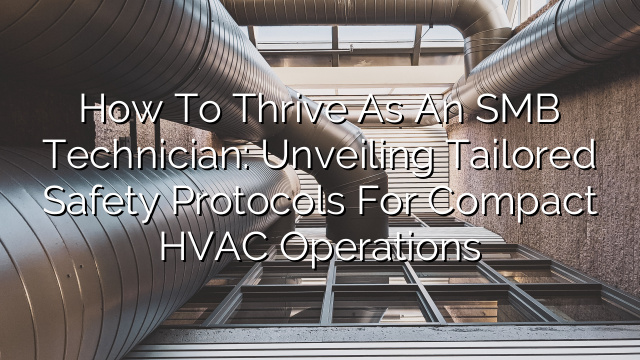Introduction
As a small and medium-sized business (SMB) technician in the HVAC industry, it is crucial to prioritize safety protocols in your daily operations. Unlike larger HVAC companies, SMB technicians often work with limited resources and manpower, making safety even more critical. In this blog post, we will unveil tailored safety protocols that will help you thrive as an SMB technician in the HVAC industry.
The Importance of Safety in Compact HVAC Operations
When working as an SMB technician in the HVAC industry, your safety should be of utmost importance. Compact HVAC operations often involve working in confined spaces, handling electrical components, and being exposed to potentially hazardous substances. By implementing tailored safety protocols, you can protect yourself and your team, reduce the risk of accidents, and ensure that your HVAC operations run smoothly.
1. Personal Protective Equipment (PPE)
Personal Protective Equipment (PPE) is crucial for maintaining safety in compact HVAC operations. Make sure you and your team have the necessary PPE at all times, including:
- Safety glasses: Protect your eyes from debris and harmful chemicals.
- Gloves: Prevent injuries from sharp objects, electrical shocks, or exposure to chemicals.
- Hard hat: Shield your head from falling objects or potential head injuries in confined spaces.
- Respiratory protection: Use respiratory masks or filters when working with substances that may pose a breathing hazard.
2. Emergency Preparedness
Being prepared for emergencies is vital in the HVAC industry. Create an emergency plan and ensure that everyone on your team is aware of it. Your emergency plan should include:
- Emergency contact information: Maintain a list of emergency contacts, including local authorities, medical facilities, and HVAC experts for complex situations.
- First aid kits: Have fully stocked first aid kits readily available at all times.
- Fire extinguishers: Install fire extinguishers in suitable locations and ensure they are regularly inspected and maintained.
- Emergency exits: Clearly mark emergency exits and conduct regular drills to ensure everyone knows the evacuation procedures.
3. Safe Handling of Refrigerants
Refrigerants used in HVAC systems can be hazardous if mishandled. Follow these safety protocols when handling refrigerants:
- Proper training: Ensure that all technicians are properly trained in the safe handling, storage, and disposal of refrigerants.
- Personal protective equipment: Use appropriate PPE, including gloves and respiratory protection, when working with refrigerants.
- Waste management: Follow the regulations for refrigerant recovery, recycling, and disposal to prevent environmental damage.
- Leak detection: Regularly inspect HVAC systems for refrigerant leaks to prevent health hazards and system inefficiencies.
4. Electrical Safety
Electrical safety is paramount in compact HVAC operations. Here are some guidelines to follow:
- Turn off the power: Always disconnect the power source before working on any electrical components.
- Lockout/tagout: Use lockout/tagout procedures to secure electrical systems and prevent accidental re-energization.
- Grounding: Ensure that all electrical systems are properly grounded to minimize the risk of electrical shocks.
- Regular inspections: Regularly inspect electrical systems for any signs of wear, damage, or potential hazards.
5. Proper Ventilation in Confined Spaces
Working in confined spaces can pose hazards due to poor ventilation. Follow these protocols to ensure proper ventilation:
- Assess the space: Before entering a confined space, assess the ventilation and air quality to determine if additional precautions are necessary.
- Use ventilation equipment: Employ fans, blowers, or other ventilation equipment to improve airflow and remove harmful gases or fumes.
- Work in teams: Whenever possible, have a buddy system in place to monitor each other’s well-being in confined spaces.
- Keep an eye on oxygen levels: Use oxygen monitors to ensure that the oxygen levels in confined spaces remain within safe limits.
FAQs
- Q: Why is safety important in compact HVAC operations?
A: Safety is crucial in compact HVAC operations to protect yourself and your team, reduce the risk of accidents, and ensure smooth operations. - Q: What PPE is required for SMB technicians in HVAC operations?
A: SMB technicians should have safety glasses, gloves, hard hats, and respiratory protection for their personal safety. - Q: How should refrigerants be handled safely?
A: Refrigerants should be handled safely through proper training, the use of personal protective equipment, and compliance with waste management regulations. - Q: What are some electrical safety protocols for SMB technicians?
A: SMB technicians should always turn off the power, use lockout/tagout procedures, ensure proper grounding, and regularly inspect electrical systems. - Q: Why is proper ventilation important in confined spaces?
A: Proper ventilation in confined spaces is important to maintain air quality, remove harmful gases or fumes, and prevent suffocation or other respiratory issues.

